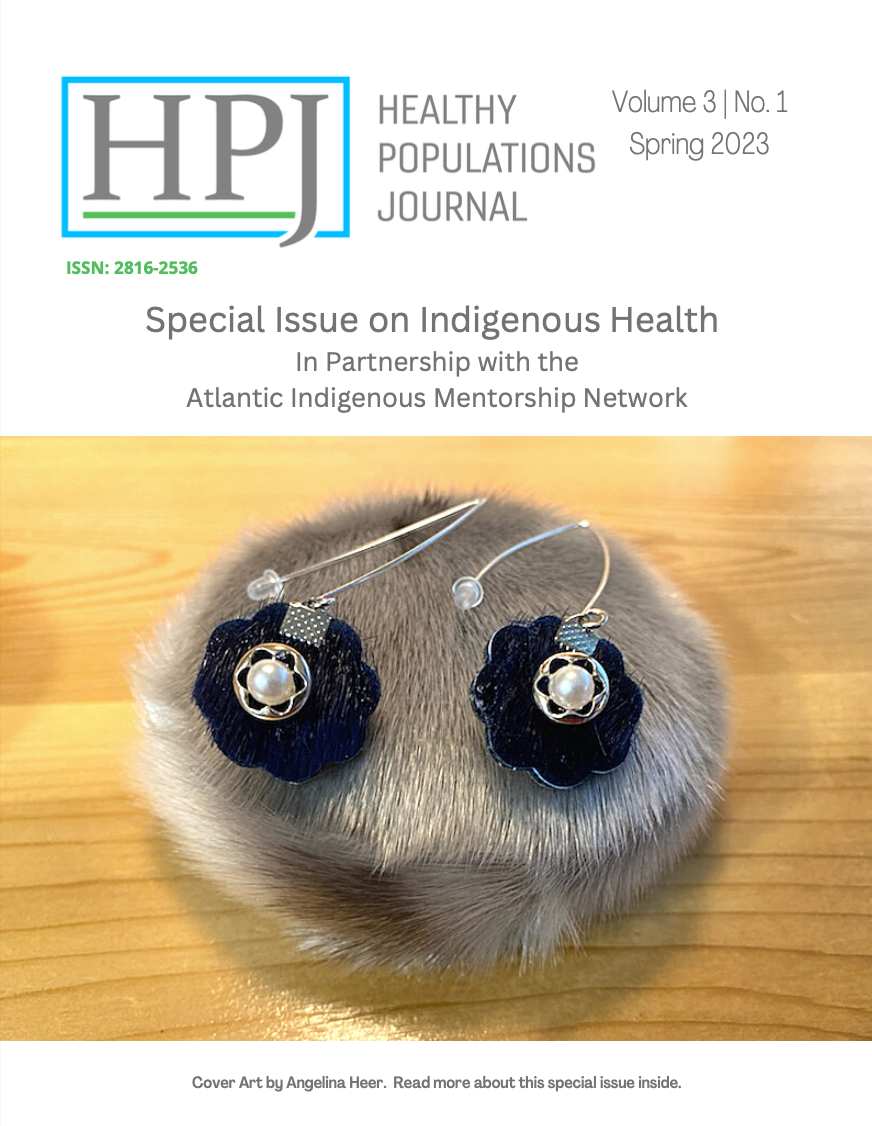Culture as Treatment: A Pathway toward Indigenous Health Equity
DOI:
https://doi.org/10.15273/hpj.v3i1.11479Schlagworte:
culture, Indigenous knowledge, Indigenous health equityAbstract
In this paper, we report on the process by which health equity has historically been conceptualized from a western lens, continuing to leave behind Native Nations. We present how the historical context impacts the present day disparities experiences by Indigenous communities in the US. We conclude with examples of Indigenous culture as treatment as a pathway towards achieving Indigenous health equity.
Literaturhinweise
Allen, J., Rasmus, S. M., Fok, C. C. T., Charles, B., Henry, D., & Qungasvik Team. (2018). Multi-level cultural intervention for the prevention of suicide and alcohol use risk with Alaska native youth: A nonrandomized comparison of treatment intensity. Prevention Science, 19(2), 174–185. http://doi.org/10.1007/s11121-017-0798-9
Arias, E., Xu, J., Curtin, S., Bastian, B., & Tejada-Vera, B. (2021, November 9). Mortality profile of the non-Hispanic American Indian or Alaska Native Population, 2019. National Vital Statistics Reports, 70(12). http://dx.doi.org/10.15620/cdc:110370
Asher BlackDeer, A., & Patterson Silver Wolf, D. A. (2020). Evidence mapping: Interventions for American Indian and Alaska Native youth mental health. Journal of Evidence-Based Social Work, 17(1), 49–62. https://doi.org/10.1080/26408066.2019.1624237
Barker, B., Goodman, A., & DeBeck, K. (2017). Reclaiming Indigenous identities: Culture as strength against suicide among Indigenous youth in Canada. Canadian Journal of Public Health, 108(2), e208–e210. https://doi.org/10.17269/CJPH.108.5754
Brady, M. (1995). Culture in treatment, culture as treatment. A critical appraisal of developments in addictions programs for Indigenous North Americans and Australians. Social Science & Medicine, 41(11), 1487–1498. https://doi.org/10.1016/0277-9536(95)00055-C
Echo-Hawk, A. (2019, August 7). Indigenous health equity. Urban Indian Health Institute. https://www.uihi.org/resources/indigenous-health-equity/
Espey, D. K., Jim, M. A., Cobb, N., Bartholomew, M., Becker, T., Haverkamp, D., & Plescia, M. (2014). Leading causes of death and all-cause mortality in American Indians and Alaska Natives. American Journal of Public Health, 104(S3), S303–S311. https://doi.org/10.2105/AJPH.2013.301798
Fiedeldey-Van Dijk, C., Rowan, M., Dell, C., Mushquash, C., Hopkins, C., Fornssler, B., Hall, L., Mykota, D., Farag, M., & Shea, B. (2017). Honoring Indigenous culture-as-intervention: Development and validity of the Native Wellness AssessmentTM. Journal of Ethnicity in Substance Use, 16(2), 181–218. https://doi.org/10.1080/15332640.2015.1119774
Gone, J. P. (2013). Redressing First Nations historical trauma: Theorizing mechanisms for Indigenous culture as mental health treatment. Transcultural Psychiatry, 50(5), 683–706. https://doi.org/10.1177/1363461513487669
Goodkind, J., LaNoue, M., Lee, C., Freeland, L., & Freund, R. (2012). Feasibility, acceptability, and initial findings from a community-based cultural mental health intervention for American Indian youth and their families. Journal of Community Psychology, 40(4), 381–405. https://doi.org/10.1002/jcop.20517
Hirchak, K. A., Nadeau, M., Vasquez, A., Hernandez-Vallant, A., Smith, K., Pham, C., Oliver, K. A., Baukol, P., Lizzy, K., Shaffer, R., Herron, J., Campbell, A. N. C., & Venner, K. L. (2022). Centering culture in the treatment of opioid use disorder with American Indian and Alaska Native communities: Contributions from a National Collaborative Board. American Journal of Community Psychology. Advance online publication. https://doi.org/10.1002/ajcp.12620
Indian Health Service. (2018). Report on behavioral health, 2018 edition. https://www.ihs.gov/sites/dps/themes/responsive2017/display_objects/documents/IHS2018BehavioralHealth.pdf
Indian Health Service. (2020, August). IHS profile. https://www.ihs.gov/newsroom/factsheets/ihsprofile/
Jensen, A., & Lopez-Carmen, V. A. (2022). The “elephants in the room” in U.S. global health: Indigenous Nations and white settler colonialism. PLOS Global Public Health, 2(7), Article e0000719. https://doi.org/10.1371/journal.pgph.0000719
Listug-Lunde, L., Vogeltanz-Holm, N., & Collins, J. (2013). A cognitive-behavioral treatment for depression in rural American Indian middle school students. American Indian and Alaska Native Mental Health Research, 20(1), 16–34. https://doi.org/10.5820/aian.2001.2013.16
Pomerville, A., & Gone, J. P. (2019). Indigenous culture-as-treatment in the era of evidence-based mental health practice. In C. Fleming & M. Manning (Eds.), Routledge handbook of Indigenous wellbeing (pp. 237–247). Routledge.
Snyder Act, 25 U.S.C. 13. (1921). https://www.govinfo.gov/content/pkg/COMPS-5302/pdf/COMPS-5302.pdf
Steinman, E. W. (2016). Decolonization not inclusion: Indigenous resistance to American settler colonialism. Sociology of Race and Ethnicity, 2(2), 219–236. https://doi.org/10.1177/2332649215615889
Warne, D., & Lajimodiere, D. (2015). American Indian health disparities: Psychosocial influences. Social and Personality Psychology Compass, 9(10), 567–579. www.doi.org/10.1111/spc3.12198
Yamane, C. Y. E. W., & Helm, S. (2022). Indigenous culture-as-health: A systematized literature review. Journal of Prevention, 43(2), 167–190. https://doi.org/10.1007/s10935-022-00666-3
Downloads
Veröffentlicht
Ausgabe
Rubrik
Lizenz
Copyright (c) 2023 Autumn Asher BlackDeer

Dieses Werk steht unter der Lizenz Creative Commons Namensnennung - Nicht-kommerziell 4.0 International. The journal aims to reduce barriers to publishing and sharing research and inequalities to accessing information.This journal provides immediate open access to its content on the principle that making research freely available to the public supports a greater global exchange of knowledge. The open-access nature of the journal means that there will be no charge for authors or readers to use the journal. The journal has a Creative Commons Attribution Non-Commercial (CCBYNC) attribution which allows the author (and others) to share and distribute their full-text article in other public domains, such as Google Scholar or Research Gate.


